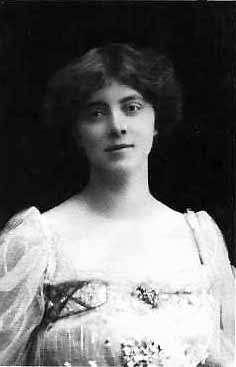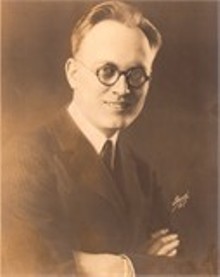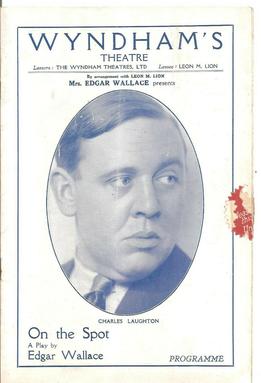Related Research Articles

Dame Mary Louise Webster,, known professionally as May Whitty and later, for her charity work, Dame May Whitty, was an English stage and film actress. She was one of the first two women entertainers to become a Dame. The British actors' union Equity was established in her home in 1930.

Una O'Connor was an Irish-born American actress who worked extensively in theatre before becoming a character actress in film and in television. She often portrayed comical wives, housekeepers and servants. In 2020, she was listed at number 19 on The Irish Times list of Ireland's greatest film actors.
The Gorilla is a three-act play written by Ralph Spence. Donald Gallaher produced it on Broadway, where it opened at the Selwyn Theatre on April 28, 1925. The play was a success and ran on Broadway for 257 performances. A production opened in London at the New Oxford Theatre on June 30, 1925, and ran for 134 performances. The play was a parody of popular theatrical mysteries such as The Bat and The Cat and the Canary. Its advertisements claimed it "outbats The Bat".
Frederick J. Jackson, also known professionally as Fred Jackson and Frederick Jackson and under the pseudonym Victor Thorne, was an American author, playwright, screenwriter, novelist, and producer for both stage and film. A prolific writer of short stories and serialized novels, most of his non-theatre works were published in pulp magazines such as Detective Story Magazine and Argosy. Many of these stories were adapted into films by other writers.

J. Harold Murray was an American baritone singer and actor. For more than a decade, during the Roaring Twenties and the Depression Thirties, he contributed to the development of musical theater by bridging vaudeville, operetta and the modern American musical. The most popular American songs he introduced on Broadway included "Autumn in New York" ; "Let's Have Another Cup of Coffee" and "Soft Lights and Sweet Music" ; "Rio Rita", "The Kinkajou" and "The Rangers Song" ; and "Mandalay".

Viola Tree was an English actress, singer, playwright and author. Daughter of the actor Herbert Beerbohm Tree, she made many of her early appearances with his company at His Majesty's Theatre. Later she appeared in opera, variety, straight theatre and film.
Kismet is a three-act play written in 1911 by Edward Knoblauch. The title means Fate or Destiny in Turkish and Urdu. The play ran for 330 performances in London and later opened in the United States. It was subsequently revived, and the story was later filmed several times and adapted for the 1953 musical.

Harlan Thompson was an American theatre director, screenwriter, lyricist, film director, and film and television producer. He wrote the Broadway hit Little Jessie James (1923–24), and several other Broadway musicals. He moved to Hollywood, where he was in turn a writer, director and producer.

James Alexander Chapman, known by his stage name, Jay Laurier, was an English actor. Early in his career he was a music hall performer, but by the late 1930s he was playing in the works of Shakespeare at the Shakespeare Memorial Theatre in Stratford-upon-Avon as well as having a career in films.

Gerald Leslie Lawrence was a British actor and manager.
Stanislaus Stange (1862–1917) was a playwright, librettist and lyricist who created many Broadway shows in the fin-de-siecle era and early 20th century. After minor success as an actor, Stange made his career as a writer in the musical theatre, moving towards more varied theatrical work before his death.
Women Aren't Angels is a 1941 play by the British writer Vernon Sylvaine and featured Robertson Hare, Alfred Drayton and Judy Kelly in its original cast.

Madge Lessing was a British stage actress and singer, panto principal boy and postcard beauty of Edwardian musical comedy who had a successful career in the West End in London, Europe and on Broadway from 1890 to 1921 and who made a number of early film appearances in Germany for director Max Mack.

The Earl Carroll Vanities was a Broadway revue presented by Earl Carroll in the 1920s and early 1930s. Carroll and his show were sometimes controversial.

On the Spot is a 1930 Chicago-set play by the British writer Edgar Wallace. Wallace was inspired by a visit to the United States and, in particular, the Saint Valentine's Day Massacre. Known as a prolific author, he reportedly dictated the manuscript for the play in just four days. It was his greatest theatrical success.
The Calendar is a 1929 play by the British writer Edgar Wallace. It is a crime thriller set in the world of horse racing world, the sport being among Wallace's interests. The protagonist is a financially struggling racehorse owner with a shady reputation. It premiered at the Palace Theatre in Manchester before transferring to Wyndham's Theatre in the West End.
Smoky Cell is a thriller play by the British writer Edgar Wallace first staged in 1930. In America a group of detectives hunt down a notorious racketeer.

Flowers of the Forest is a 1934 play by the British writer John Van Druten. It lasted for a brief West End run of fourteen performances at the Whitehall Theatre with a cast including Henry Oscar, Haddon Mason, Stephen Haggard, Barry K. Barnes and Lewis Casson. In New York it played for forty performances at the Broadway Martin Beck Theatre with a cast that included Hugh Williams and Burgess Meredith.

Most of the Game is a 1935 comedy play by the British writer John Van Druten. Much of the play is set in New York where a British writer and his aristocratic wife have fallen out of love with each other, and started new relationships with a teacher's daughter and a Hollywood actor respectively. Complications ensue when the press gets hold of the story.

There's Always Juliet is a 1931 comedy play by the British writer John Van Druten about an American architect who falls in love with an Englishwoman.